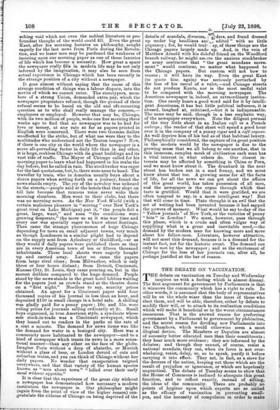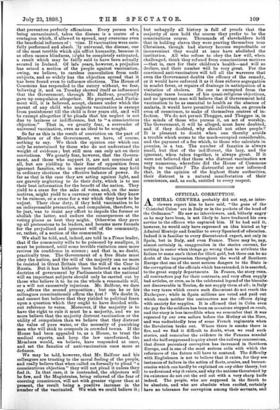THE DEBATE ON VACCINATION. T HE debate on vaccination on Tuesday
and Wednesday inspires us with a feeling which is almost dismay. The first argument for government by Parliaments is that it winnows the community which has a right to rule. In other words, it is assumed that the body of representatives will be on the whole wiser than the mass of those who elect them, and will be able, therefore, either by debate to modify their will, or to attach to its realisation conditions which will make it beneficial or in the worst circumstances innocuous. That is the avowed reason for preferring government by a Parliament to government by plebiscites, and the secret reason for dividing new Parliaments into two Chambers, which would otherwise seem a most illogical device. The Members or Deputies are almost of necessity better educated men than their eonstituents ; they hear much more evidence ; they are informed by the debates; and though they cannot, of course, resist a national mandate, they can, when its force is not over- whelming, resist, delay, or, so to speak, purify it before carrying it into effect. They act, in fact, as a sieve for the decrees of the nation, keeping out those which are the result of prejudice or ignorance, or which are hopelessly unpractical. The debate a Tuesday seems to show that the House of Commons is inclined to abnegate this great function, and to reflect exactly, instead of sifting, the ideas of the community. There are probably no points of hygiene upon which experts are so united as the efficacy of vaccination in preventing small- pox, and the necessity of compulsion in order to make that preventive perfectly efficacious. Every person who, being unvaccinated, takes the disease is a centre of a contagion which, if allowed to spread, may overcome even the beneficial influence of 1, ^eine. If vaccination were care- fully performed and absolt. ,'.1y universal, the disease, one of the most terrible which can afflict humanity, because it so often causes blindness, i.i;ght be completely extirpated, a result which may be faiily said to have been actually secured in Ireland. Of late years, however, a prejudice has seized a section of the people against vaccination, owing, we believe, to careless innoculation from unfit subjects, and so widely has the objection spread that it has been found even to influence elections. The House of Commons has responded to the outcry without, we fear, believing it, and on Tuesday showed itself so influenced that the Government, through Mr. Balfour, practically gave up compulsion altogether. He proposed, and Parlia- ment will, it is believed, accept, clauses under which the parent of any child who neglects vaccination is exempt from punishment till the child is four years old, and will be exempt altogether if he pleads that his neglect is not due to laziness or indifference, but to "a conscientious objection." That is, we greatly fear, a surrender of universal vaccination, even as an ideal to be sought.
So far as this is the result of conviction on the part of Members or of the Government, we have, of course, nothing to say. We think the opinion one which can only be entertained by those who do not understand the weight of evidence ; but still men can only act on their convictions. We greatly fear, however, that the Govern- ment, and those who support it, are not convinced at all, but are yielding to their fear of opposition from ignorant fanatics, who in many constituencies may hold in ordinary elections the effective balance of power. So far as that is the case they are acting against light, and are gravely neglecting to do their duty, which is to use their best information for the benefit of the nation. They yield to a craze for the sake of votes, and, on the same motives, might yield to a currency craze which they knew to be ruinous, or a craze for a war which they knew to be unjust. Their clear duty, if they held vaccination to be an indispensable precaution, and compulsion, therefore, to be just, was to resist any effort to impede the former or abolish the latter, and endure the consequences at the voting places as best they might. Otherwise they gave up all pretensions to be leaders, and. became mere funnels for the prejudiced and ignorant will of the community, or, rather, of a section of the community.
We shall be told, and, indeed, are told in a Times leader, that if the community wills to be poisoned by smallpox, it must be poisoned, until some terrible visitation once more revives its confidence in science ; and that is, no doubt, practically true. The Government of a free State must obey the nation, and. the will of the majority can no more be resisted in Great Britain than the will of the Czar in Russia. But it has hitherto been believed as a cardinal doctrine of government by Parliaments that the national will on important subjects should only be carried out by those who believe it to be on the whole a reasonable will, or a will not excessively injurious. Mr. Balfour, we dare say, affirms the second proposition ; but can he or his colleagues conscientiously affirm the first ? We doubt it, and cannot but believe that they yielded to political fears upon a question which they ought to have decided with- out reference to votes. Moreover, if the majority is to have the right to rule it must be a majority, and we no more believe that the majority distrust vaccination or the utility of compulsion than we believe that they distrust the value of pure water, or the necessity of punishing men who will stick to cesspools in crowded towns. If the House had been appealed to, as a House, to trust the medical experts, and keep the law unreformed, the Members would, we believe, have responded at once, and set the fanatics of anti-vaccination once more at defiance.
We may be told, however, that Mr. Balfour and his colleagues are trusting to the moral feeling of the people, and really believe that when called on formally to plead "a conscientious objection" tbey will not plead it unless they feel it. In that case, it is contended, the objectors will be few, and the Magistrates, being relieved of the fear of coercing consciences, will act with greater vigour than at present, the result being a positive increase in the number of the vaccinated. We wish we could believe it ; but unhappily all history is full of proofs that the. majority of men hold. the course they prefer to be the conscientious course. Thousands of slaveholders held. that in holding slaves they were proving themselves true Christians, though had slavery become unprofitable or inconvenient they would. at once have abolished the- institution. All who refuse to obey the law will, when. challenged, think they refused from conscientious motives —that is, care for their children's health—and will so. declare, and their number will be very great. For the convinced anti-vaccinators will tell all the waverers that even the Government doubts the efficacy of the remedy, or it would have enforced it as it does enforce segregation in scarlet fever, or repairs of drainage in anticipation of a. visitation of cholera. No one is exempted from the drainage taxes because of his quasi-religious objections, and no ignorant man will believe that if Government held. vaccination to be as essential to health as the absence of malaria, it would have permitted individuals, on grounds even of conscience, to make of themselves centres of in.. fection. We do not permit Thuggee, and Thuggee is, in the minds of those who pursue it, an act of worship. The Government, it will be alleged, must have doubted, and if they doubted, why should not other people ? It is pleasant to doubt when one thereby avoids a trouble which seems to the much-occupied considerable,. and the payment of a fee which, to those who calculate in pennies, is a tax. The number of fanatics is always small, but that of the indifferent, the lazy, and the ignorant, when taken together, is always great. If it were not believed that those who distrust vaccination are very numerous, wherefore did the House of Commons begin to vacillate ? The distrustful are now informed that, in the opinion of the highest State authorities, their distrust is a natural manifestation of their consciences, and, as such, entitled to every respect.



































 Previous page
Previous page